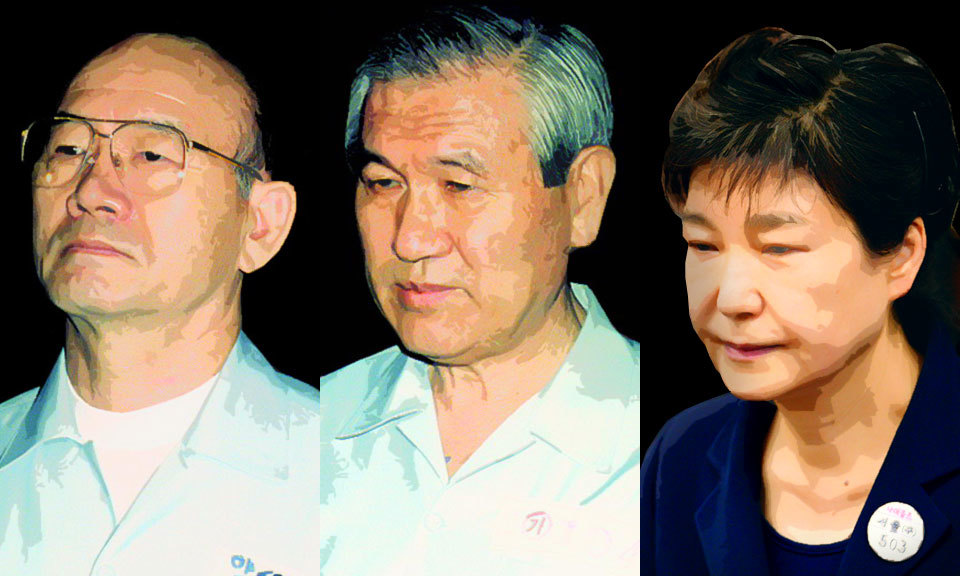 |
|
Former presidents Chun Doo-hwan, Roh Tae-woo, and Park Geun-hye
|
Park Geun-hye’s guilty verdict is similar to previous presidents Chun Doo-hwan and Roh Tae-woo
“In terms of harm caused to the constitutional order, the crime is very serious, and in connection with the exploitation of the President’s office to amass large amounts of riches . . . [the court] must assign the maximum legal sentence.” (from the first trial sentencing of ex-President Chun Doo-hwan on Aug. 26, 1996) “Chief responsibility for the government order lapsing into disorder and an impeachment incident occurring lies with the President, who neglected the responsibilities assigned to her by the Constitution. . . . [The court] must hold her accountable to send a warning and ensure that the government is not again plunged into chaos.” (from the first trial sentencing of ex-President Park Geun-hye on Apr. 6, 2018) The reason given by the court in the sentencing of Park Geun-hye on Apr. 6 was similar to that given in the first trial sentences against fellow former Presidents Chun Doo-hwan and Roh Tae-woo 22 years ago. While the crimes were different, the courts held all three sternly to account for abusing the great authority of the presidency for personal ends. On Nov. 16, 1995, Roh became the first former president to be detained when he was arrested on charges of establishing a slush fund containing hundreds of millions of dollars. The following Dec. 21, Chun was arrested and indicted on charges including rebellion. Both strenuously denied the charges against them from the prosecutors’ investigation stages. They also refused to appear in court after their personally appointment attorneys resigned en masse during the first trial and a public defender was appointed in their stead. But when the judge announced plans to carry them in by force, they immediately reported back to court. In their first trials, Chun and Roh were convicted on charges including orchestrating the coup of Dec. 12, 1979, and ruthlessly quashing the May 18 Gwangju Democratization Movement. The former was sentenced to death, the latter to 22 years and six months in prison. In their appeals, the sentences were commuted and finalized as life in prison and 220.5 billion won (US$206.2 million) in penalties for Chun and 17 years in prison and 262.8 billion won (US$245.8 million) in penalties. While both received special presidential pardons in Dec. 1997, the pardons did not extend to the penalties. After refusing to pay 167.3 billion won (US$156.5 million) in back penalties, Chun became the subject of the so-called “Chun Doo-hwan Act” in 2013, which extended the statute of limitations for penalty collection and confiscation. Another former president, Lee Myung-bak, is also set to be delivered for trial on Apr. 9 after his Mar. 22 detention as charges of accepting over 10 billion won (US$9.35 million) in bribes, misappropriating 35 billion won (US$32.7 million), and evading millions of dollars in taxes. In terms of his response to the prosecutors’ investigation, Lee’s objections have been the most vociferous. While Park agreed to questioning by prosecutors visiting her detention center, Lee has refused visits by prosecutors three times since his incarceration. By Hyun So-eun, staff reporter Please direct questions or comments to [english@hani.co.kr]






